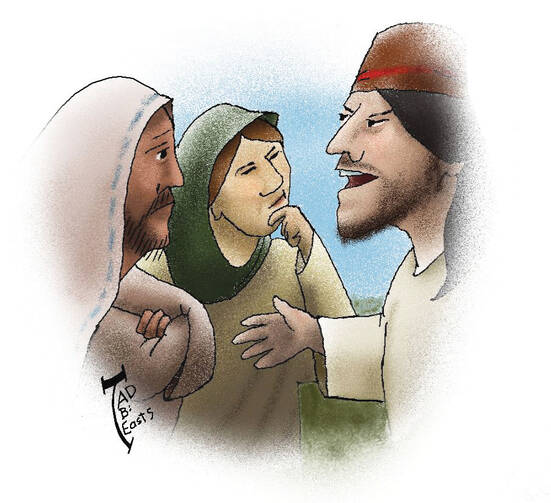Disciples I Fear
We might not say it outright, although unfortunately many of us do, but we are often not convinced that so-and-so is a true Christian. We might know the person well, by public reputation or just by name, or we might not know the name of the person at all who bothers us, or worse, with their words and behavior. From a friend’s Facebook post came this comment about a Catholic politician: “You can’t be Catholic if.... And this is one of those if’s.” Thank goodness we can now determine the state of a person’s soul on Facebook.
Yet the 2015 social media response is similar to the one Paul evoked when the Christians “were all afraid of him, for they did not believe that he was a disciple.” Now it is true that when Paul was creating fear in the hearts of the Christians of Damascus and Antioch, they had good reasons to fear him. Paul was a persecutor of the church who had officially aided in the killing of Stephen. How could they be sure Paul was not intending to trap them?
There are, frankly, reasons to mistrust certain people because of their behavior and beliefs; and even forgiveness, the heart of the church’s mission, does not mean someone should be restored to positions of authority or trust in the church or society. But we do need to ask ourselves how we are judging people within the church, our brothers and sisters, or those outside the church, called to be one family with us, and whether it is the product of true discernment or simply gossip, fear and bias.
In many and various ways, we question the reality or sincerity of our brothers’ and sisters’ beliefs and actions, sometimes because of actual bad behavior, sometimes because of incomplete information and sometimes just because we do not like that person.
Our judgment, in fact, is often about God’s grace and its ability to transform and convert even the most hardened soul. Or we are judging on partial information or just a human propensity to prefer certain people over other people. Some people just bug us for no real reason.
Barnabas defended Paul, reporting that Paul had an encounter with the risen Lord, “who had spoken to him,” and that in Damascus “he had spoken boldly in the name of Jesus.” Paul had been transformed by God’s grace from a man willing to kill to impose his view of God, to one willing to be killed in order to evangelize.
Are we allowing that God can work in peoples’ hearts and souls? Paul was worthy of trust because he acted out the Gospel “not in word or speech, but in truth and action.” We are asked by God to “obey his commandments and do what pleases him. And this is his commandment, that we should believe in the name of his Son Jesus Christ and love one another, just as he has commanded us.” When we judge our brothers and sisters as not measuring up to the commandments, are we loving them? Do we judge ourselves with the same sharp eye for mistakes that we have for those of others? Are we praying for the conversion of others and ourselves?
There is indeed judgment. There can be no truth or justice without it, but we often set ourselves as the true arbiters of judgment, even if it is in the quietness of our hearts where we whisper condemnation of the “others,” however we may categorize and group them. But this is not our personal task. Jesus is “the true vine” and God “is the vinegrower.” It is God who “removes every branch that bears no fruit. Every branch that bears fruit he prunes to make it bear more fruit.” We have no need to condemn, for we do not know how God is pruning others or ourselves, preparing us to flourish in growth and fruitfulness.
God looks at us, whoever we are, at whatever point we are in our lives, however far we have strayed, and asks that we “bear much fruit and become my disciples.” Do not fear the other disciples; just attempt to become one more firmly rooted in the soil that nourishes us all, entwined with the vine and pruned by the loving hands of the vine grower.
This article also appeared in print, under the headline “Disciples I Fear,” in the April 27, 2015, issue.








